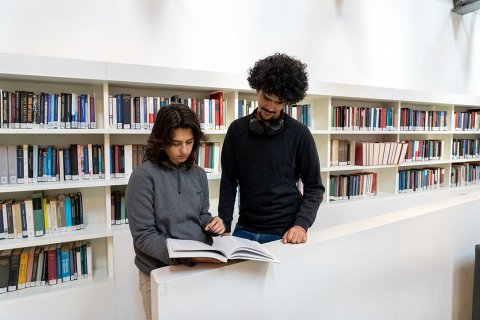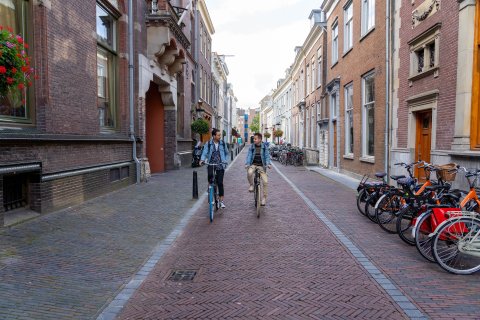Study programme

The full Bachelor's programme English Language and Culture takes three years. Each year consists of four blocks of ten weeks and ends with an exam week. In your first year, you will attend an average of 12-18 hours of education per week, taught entirely in English from day one.
Courses
At English Language and Culture in Utrecht, you will follow your subjects in coherent packages. This ensures a good structure. Because you will always study the subjects within a package with the same fellow students, you will also get to know each other well. From the second year onwards, you will study the subject of English language and culture in greater depth. You can choose from various related specialisations: 'Language Learning and Teaching across the Lifespan', 'Self, Others, and the Literary World', 'Transforming Texts', or 'The Social Life of English'.
Teaching methods
During the programme, you will encounter various types of teaching. These include lectures, where a lecturer explains the material, seminars, where you engage with the material through discussions and short tasks with fellow students and the lecturer, and project groups, where you work on larger assignments with other students. In addition to attending lectures and participating in group work, you will also spend about 24 hours per week on self-study.
Teaching method | Percentage |
Lectures | 10% |
Tutorials | 10% |
Practicals | 10% |
Group study | 15% |
Independent study | 55% |
Choose your own direction
One-third of the courses in the programme are elective courses. You can fill this space with subjects according to your own interests. You can follow a second in-depth package in your own study programme, but you can also choose a package with related subjects from another study programme. For example: Administration and Organisation, Economics, Entrepreneurship, Digital Humanities, Game Studies, History, Islam and Arabic, Italian and many more.
By making use of the elective component, you can decide which direction you want to take. In your elective component you can also prepare yourself for education and get acquainted with the school subject of English, which will give you a second grade teaching qualification, allowing you to teach the lower grades of HAVO/VWO and VMBO-T.
Internship (abroad)
Doing an internship is fun and an excellent opportunity to gain practical experience. You can do an internship both in the Netherlands and abroad (Dublin, New York or London for example). English students have previously worked at educational publishers, translation agencies, schools and the Dutch Consulate in London.
Group size
On average, around 100 students start the Bachelor's programme English Language and Culture each year. In the tutorials you will sit with approximately 20-25 fellow students. In the first year, the average group size at lectures is a lot higher, because you will follow a number of lectures with students from other study programmes.
Study guidance
You can count on good guidance and personal advice during your studies. We have various employees, such as mentors, tutors and study advisors, who will support you with study-related issues. But they also offer guidance and advice on issues that are not directly related to your study programme.
Binding recommendation regarding the continuation of studies (BSA)
At the end of the first academic year, every student receives binding recommendation regarding the continuation of studies (BSA). You must obtain at least 45 of the 60 credits of the Bachelor's programme in English Language and Culture in order to continue your studies.


